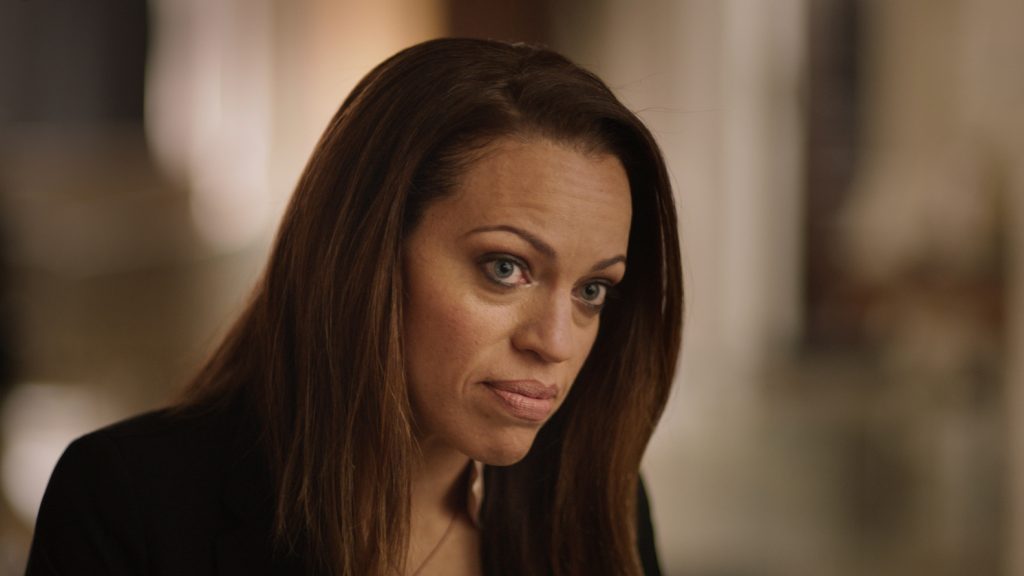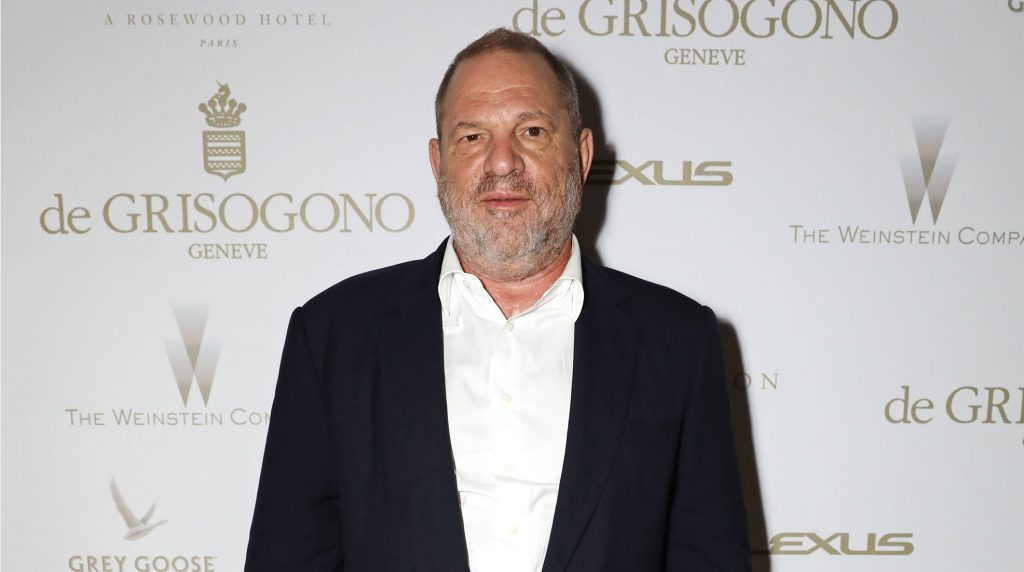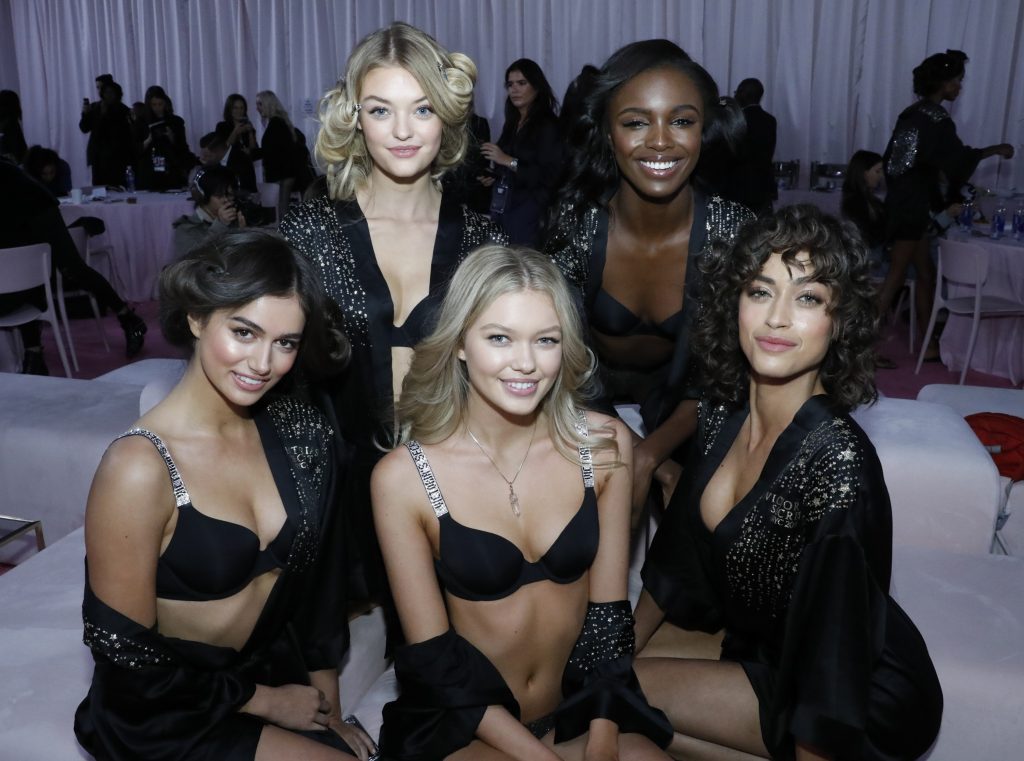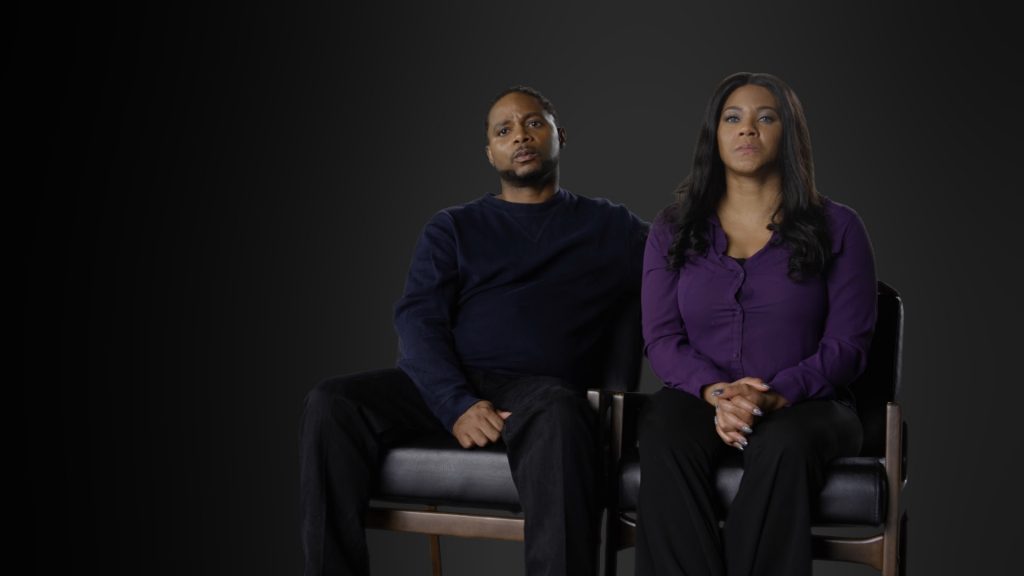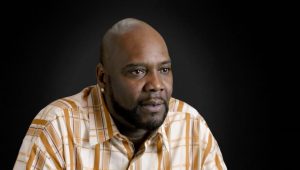June 24, 2020
by Carla Hay

Directed by Bonni Cohen and Jon Shenk
Culture Representation: The documentary “Athlete A” interviews an all-white group of people to discuss how officials and survivors handled the crimes of convicted sex offender Larry Nassar, the disgraced former doctor who worked for USA Gymnastics and Michigan State University.
Culture Clash: The documentary examines how Nassar’s crimes were actively covered up by officials and how a team of Indianapolis Star investigative reporters exposed the Nassar scandal in 2016.
Culture Audience: “Athlete A” will appeal primarily to people who like true-crime documentaries, but the movie doesn’t uncover anything new and leaves out some important details.

There will be inevitable comparisons of Netflix’s 2020 documentary film “Athlete A” (directed by Bonni Cohen and Jon Shenk) and HBO’s 2019 documentary film “At the Heart of Gold: Inside the USA Gymnastics Scandal” (directed by Erin Lee Carr), because both documentaries essentially cover the same topic. Neither film uncovers anything new about the 2016 scandal that exposed Larry Nassar’s sexual abuse of hundreds of female patients while he worked as a doctor for USA Gymnastics and Michigan State University. “Athlete A” takes a different angle from “At the Heart of Gold” by giving more of a spotlight to the Indianapolis Star newspaper team that broke the story.
“Athlete A” gets its title from the alias that was given to gymnast Maggie Nichols when she filed a formal complaint with USA Gymnastics in 2015 to report that Nassar had sexually abused her numerous times, in the guise of administering “medical examinations.” Nichols’ complaint was one of several that USA Gymnastics actively covered up and did not report to police. Michigan State University also did the same thing when it received numerous sexual-abuse complaints about Nassar, whose known abuse spanned more than 20 years.
Maggie Nichols is among the survivors of Nassar’s abuse who are interviewed in “Athlete A,” which also interviews former gymnasts Rachael Denhollander, Jessica Howard and Jamie Dantzscher, who are also survivors of Nassar’s abuse. “Athlete A,” which focuses more on how the scandal went public, has a much smaller number of people interviewed, compared to “At the Heart of Gold,” which has a broader look at the aftermath of the scandal. And ultimately, taking a much narrower view might be why “Athlete A” provides a less complete picture than “At the Heart of Gold.”
The Nassar scandal exposed the culture of cover-ups, abuse, silence and intimidation that many female gymnasts (who are usually underage when the abuse starts) have had to endure in their quest for athletic glory. Several media outlets and documentaries have already done in-depth investigations and reported their findings of the Nassar scandal, but the Indianapolis Star was the first to break the story.
“Athlete A” gives a lot of screen time to the Indianapolis Star team members who broke the story: investigations editor Steve Berta and investigative reporters Marisa Kwiatkowski, Mark Alesia and Tim Evans. They all give a step-by-step replay of how they uncovered how deep the scandal was and how far back the cover-ups were, as more and more women started coming forward to the Indianapolis Star with their Nassar horror stories.
Berta says of the culture of female gymnastics: “What the culture was like was new to me, and we were sort of plunged into it.” Kwiatkowski explains that the Indianapolis Star (which is nicknamed the Indy Star) somewhat stumbled onto the Nassar story when the newspaper was investigating a broader story on why people don’t report sexual abuse in schools.
The Indianapolis Star got a tip to look into USA Gymnastics, and that led the reporters down the path to find out about Nassar’s sex crimes and what officials did to cover up the complaints against him. (Nassar has now been stripped of his medical license. In 2017 and 2018, he received numerous prison sentences that will ensure that he will die in prison.)
Curiously, “Athlete A” paints an incomplete picture by focusing mostly on USA Gymnastics as the chief perpetrator of the cover-ups, and the documentary largely ignores Michigan State University’s similar cover-ups of Nassar’s crimes. Several officials from USA Gymnastics and Michigan State University have since been fired or have resigned because of the Nassar scandal. Many of these disgraced officials are facing criminal and/or civil cases because of their involvement in the scandal.
As many people who are familiar with the scandal already know, USA Gymnastics had a policy to not report a sexual-abuse claim to the police unless the alleged victim, the alleged victim’s parents and/or an eyewitness signed the complaint. Most of the accusers were underage children, so this policy goes against most U.S. state laws that require companies and organizations to report complaints of underage sexual abuse to police.
Nassar certainly wasn’t the only one to be accused, and when his sex crimes were exposed, the media also uncovered that over a period of 10 years, USA Gymnastics had received sexual-abuse complaints against approximately 54 coaches (most of the crimes were against underage girls), but those complaints were never reported to police. USA Gymnastics often transferred many of those coaches to other locations.
Steven Penny Jr., who was president/CEO of USA Gymnastics from 2005 to 2017, is portrayed in “Athlete A” as the king of the Nassar cover-ups. The documentary includes some brief commentary about him, including people who say that Penny abused his power and that his marketing background caused him to give more priority to image and sponsorship deals for USA Gymnastics instead of the safety and well-being of the athletes.
Berta says, “They [USA Gymnastics] were so busy trying to sell that brand that they didn’t have time for these girls.” The documentary also includes archival news footage of Penny’s pathetic appearance in a 2018 U.S. Senate subcommittee hearing, when he invoked the Fifth Amendment of the U.S. Constitution in his refusal to answer any questions.
Gina Nichols and John Nichols, the parents of Maggie Nichols, say in “Athlete A” interviews that they had trusted Penny when he told them that USA Gymnastics would be handling Maggie’s sexual-abuse complaints against Nassar. The Nicholas parents say that when Sarah Jantzi, Maggie’s coach at the time, first reported the abuse to USA Gymnastics in 2015, the company ordered the Nichols parents and Jantzi not to go to the police and were told that the matter was going to be handled internally by USA Gymnastics.
A human-resources consultant hired by USA Gymnastics interviewed Maggie, but when her parents followed up to find out the status of the investigation, they were stonewalled by USA Gymnastics and told that they couldn’t reveal any details because it was an ongoing investigation. Meanwhile, Nassar continued to be a USA Gymnastics doctor, and several gymnasts later testified that he abused them before, during and after the 2016 Olympics.
Maggie Nichols eventually went public in 2018 about how Nassar abused her. But her experience is strikingly similar to others who survived his abuse. (Nassar is believed to have sexually abused at least 500 female patients.) All of his survivors, and even people who weren’t abused by Nassar, say that he easily fooled people into thinking he was the “nice guy” in a sea of gymnastic coaches and officials who were tough and openly abusive to athletes.
If people are wondering why all these parents of underage kids didn’t take it upon themselves go to the police after finding out about the abuse, it’s explained in “Athlete A” (and other documentaries/news reports about the Nassar scandal) that USA Gymnastics had the power to decide who would be selected to go to the Olympics. These parents naïvely trusted that USA Gymnastics would do the right thing in handling the abuse complaints, but there was also fear of upsetting Penny and other people at the top who could make or break their daughters’ Olympic dreams.
Gina Nichols and John Nichols believe that Maggie was blackballed from being on the Olympic team because she was a “whistleblower.” Maggie was a bronze medalist at the 2014 USA Gymnastics National Championships and a silver medalist at the 2015 USA Gymnastics National Championships. She was considered a top contender to be chosen for the USA Gymnastics women’s team for the 2016 Olympics.
Despite a having a knee injury at the 2016 Olympic tryouts, Maggie performed well, but didn’t make the Olympic team, while some Nationals team alternates were chosen instead. Gina Nichols and John Nichols say in the documentary that they saw signs that USA Gymnastics had blackballed them because the organization treated them differently after Maggie’s abuse was reported to USA Gymnastics, but the complaint against Nassar hadn’t been made public yet.
After the abuse was reported, Gina Nichols and John Nichols say that at the 2016 Olympic tryouts, they didn’t have reserved seats and there weren’t TV cameras following them, as there normally would have been for all the other USA Gymnastics televised events where star gymnast Maggie previously participated. The Nichols parents don’t come right out and accuse anyone specific for causing this blatant snubbing, but it’s obvious that they believe several people’s claims that Penny demanded it. The good news is that Maggie went on to achieve gymnastic championships in the National Collegiate Athletic Association, while she was a student at the University of Oklahoma.
“Athlete A” includes archival video footage of Denhollander being interviewed in 2016 by the Indianapolis Star when she came forward to expose Nassar, 16 years after he abused her. She says at one point: “I wish I had dealt with it 16 years ago. I don’t think I could’ve dealt with it, but I can now.”
The documentary also shows the toll that this abuse took on the survivors, many of whom were ridiculed and not believed when they first came forward. Denhollander, who looks painfully thin in her 2016 interview with the Indianapolis Star, says that she had trouble eating because of all the stress. Dantzscher, who was on the USA Olympics team in 2000, says that gymnastics was her “first love,” but she tearfully admits that it took her years to be proud to be an Olympian because Nassar abused her at the Olympics and she associated the Olympics with the shame of the abuse.
“Athlete A” also delves into the history of women’s gymnastics to explain how it went from being a sport that had mostly regular-sized adult women prior to the 1960s but it eventually changed into a sport dominated by underage girls, and a height of 5’4″ was considered “tall” for female gymnasts. This “little girl” aesthetic for female gymnasts coincided with the rise of Romanian gymnastic coaches Béla and Márta Károlyi, a husband-and-wife duo whose Karolyi Ranch training facility in Texas was where Nassar committed a lot of his sexual abuse.
Beginning with Russian gold-medalist gymnast Olga Korbut at the 1972 Olympics and especially with Romanian gold-medalist gymnast Nadia Comăneci at the 1976 Olympics, the trend moved in the direction of underage, very petite girls being pushed to compete in gymnastics at the Olympics. Comăneci was only 14 when she became a gold medalist at the 1976 Olympics. Her victory made her coaches Béla and Márta Károlyi highly in demand to train female gymnasts.
In 1981, the Károlyis defected to the United States with their choreographer Geza Poszar, who is interviewed in “Athlete A.” The Károlyis also went on to coach Olympic gold-medalists gymnasts Mary Lou Retton and Kerri Strug. “Athlete A” spends a little too much time going off-topic by rehashing the Olympic victories of Comăneci, Retton and Strug. These gymnasts had nothing to do with Nassar.
Poszar says that the Károlyis’ method of working with gymnasts was “total control over the girls.” He says that Károlyis (and coaches just like them) often abuse the gymnasts verbally, emotionally and physically. It was common for the gymnasts to be slapped and be told that they were fat animals, says Poszar. That type of abuse was “acceptable” in his native Romania, he says, and it apparently was acceptable in the United States too.
Károlyi Ranch, a training facility near Hunstville, Texas, closed in 2018. The Károlyis are no longer USA Gymnastics coaches (Béla retired in 1997, while Márta retired in 2016), and they have both been sued for being part of the Nassar cover-up. “Athlete A” includes a clip from a videotaped deposition of Márta Károlyi admitting that she knew about complaints of Nassar’s abuse that was happening at the ranch.
People familiar with Károlyi Ranch describe it as an oppressive, isolated compound where parents weren’t allowed to visit, gymnasts were forbidden to call people outside the ranch (where cell-phone reception was difficult anyway), and people were punished for reporting abuse. The Károlyis, just like everyone else accused of covering up for Nassar, are not interviewed in “Athlete A.”
Giving her perspective on coaching techniques is former U.S. Nationals Team gymnast is Jennifer Sey, author of the 2008 memoir “Chalked Up: Inside Elite Gymnastics’ Merciless Coaching, Overzealous Parents, Eating Disorders, and Elusive Olympic Dreams.” Sey, who competed as a gymnast in the 1970s and 1980s, says that coaching methods for female gymnasts haven’t changed much over the years: “You could be as cruel as you needed to be to get what you needed out of your athletes.”
Sey adds, “The line between tough coaching and abuse gets blurred.” She and other people in the documentary (including Dantzscher) mention something that’s commonly known in the gymnastics world: Gymnasts are often forced to compete with serious injuries, including fractured or broken bones. As an example, “Athlete A” shows Strug’s 1996 Olympic victory, which happened despite her severely injuring her ankle during the last stretch of the Olympic match.
Tracee Talavera, who was on the USA Women’s Gymnastics team at the 1984 Olympics, says she remembers how the Olympic gymnasts from Eastern Europe always looked scared and they never looked happy. Mike Jacki, who was president of USA Gymnastics from 1983 to 1994, adds his perspective, by saying that the popularity of Mary Lou Retton and more American female gymnasts starting to win at the Olympics, was the start of USA Gymnastics becoming a bigger business.
“Athlete A” clearly discusses Olympic gymnasts from the 1970s and 1980s, as a way to put into context the culture of abuse that enabled Nassar. But this detour into the history of female gymnastics ultimately takes up too much time in the documentary, which should have kept its focus on the Nassar cases.
And for a documentary about the investigation of a sexual abuser who had hundreds of victims, “Athlete A” has a surprising scarcity of interviews from people in the fields of law and law enforcement. Only one personal attorney is interviewed: John Manly, who is Dantzcher’s lawyer. From law enforcement, Michigan State University Police detective lieutenant Andrea Munford and Michigan state assistant attorney Angela Povilaitis are interviewed, and they describe their involvements in the Nassar case. (Again, nothing new is revealed here.)
“Athlete A” also includes the expected news archival footage of the survivor impact statements that were read during Nassar’s 2018 sentencing hearings, after he pleaded guilty to numerous charges. Denhollander and Dantzscher were among the survivors who read their statements while a shamed Nassar sat in the courtroom. Maggie Nichols did not attend these hearings, but her mother Gina read Maggie’s statement in court. “Athlete A” does not have interviews with Nassar’s most famous survivors, including Olympic gold-medalists Simone Biles, Aly Raisman, Gabby Douglas and McKayla Maroney.
Former USA Gymnastics president/CEO Penny was arrested in 2018 on charges of evidence tampering. His criminal case is pending, as of this writing. Video footage of his arrest is included in “Athlete A.”
But in an apparent myopic zeal to make Penny look like the top evil overlord of covering up for Nassar, “Athlete A” oversimplifies and overlooks the fact that a cover-up of this magnitude and length wasn’t just orchestrated by mainly one person. “Athlete A” fails to mention two of the toxic enablers who were given some scrutiny in “At the Heart of Gold”: John Geddert (former USA Gymnastics coach) and Kathie Klages (former Michigan State University gymnastics coach). Geddert is under criminal investigation, as of this writing.* In February 2020, Klages was convicted of two counts (one felony and one misdemeanor) of lying to police.
There have been other people who’ve been accused of actively covering up for Nassar’s crimes, including former Michigan State University president Lou Anna Simon, who resigned in 2018. In 2019, Simon was charged with lying to the police, but in May 2020, those charges were dismissed. In 2018, Scott Blackmun resigned as CEO of the U.S. Olympic Committee. That same year, Alan Ashley was fired as U.S. Olympic Committee chief of sport performance over his involvement in the Nassar scandal. Simon, Blackmun and Ashley are not mentioned in “Athlete A” or in “At the Heart of Gold.”
“Athlete A'” does mention Rhonda Faehn, who was a USA Gymnastics vice president at the time that Maggie Nichols filed her complaint against Nassar, but Faehn did not go to police with the complaint. In yet another example of omitting information, “Athlete A” never mentions what happened to Faehn: She testified against Nassar in 2018 in grand-jury proceedings, then she was hired by the University of Michigan in 2019 (and then fired after one day, due to public backlash), and later that year, Faehn was given a temporary job as an international team coach at Waverley Gymnastics Centre in Australia.
“Athlete A” certainly has good intentions to put the spotlight on the serious issue of abuse, as it pertains to American female gymnasts. However, the documentary ultimately just recycles information that other people already reported. The documentary’s interviews are compelling, but the filmmakers’ lack of original investigative reporting and omission of crucial details are ultimately a letdown for this important subject matter.
Netflix premiere “Athlete A” on May 24, 2020.
*UPDATE: John Geddert committed suicide on February 25, 2021, the same day that he was indicted on 24 counts of abuse-related crimes, including human trafficking and sexual assault.
https://www.youtube.com/watch?v=JzeP0DKSqdQ

